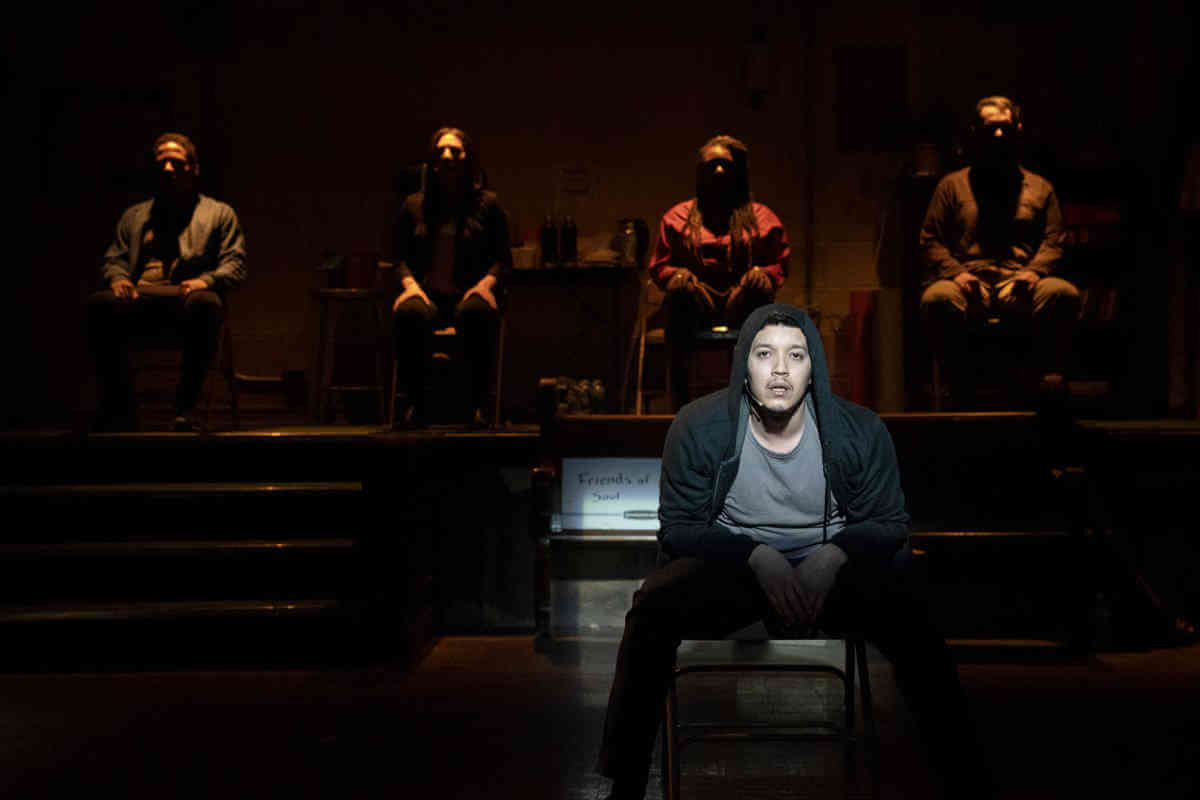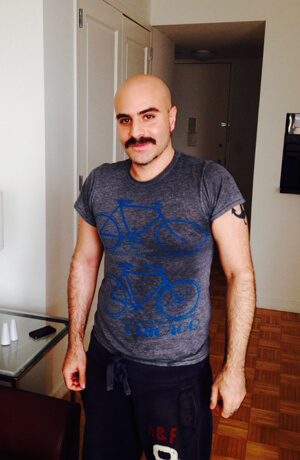“Octet,” Dave Malloy’s new chamber choir a cappella musical at the Signature, marvelously directed by Annie Tippe, is a work of absolute genius brilliantly rendered and profoundly moving. The premise is simple: eight members of a support group for Internet addiction gather for a weekly meeting. The format is similar to a traditional 12-Step meeting where members tell of their struggles. The diverse stories cover everything from dating to gaming, and at one point a character describes the types of content that cause Internet addiction: recreational, informational, social, sexual, and political. It’s hard to imagine any of us who don’t fall into at least one of those areas of obsession today, whether or not it rises to the level of addiction.
We hear the story of a woman devoted to a virtual relationship, a man who can’t stop playing candy-based games, and a married couple in bed focused on their individual screens. What resonates through each of the stories is the longing for real human connection and each character’s awareness of and grief over the isolation and inherent soul-sucking emptiness of a device-focused life. We feel the pain of the characters and their struggle as the virtual life is revealed as a toxic, debilitating illusion.
What makes this so powerful is that successful a cappella singing demands a level of connectedness between the singers that borders on the intimate. That, of course, is the antithesis of the subject matter and creates a compelling dramatic tension throughout. The cast — Adam Bashian, Kim Blanck, Starr Busby, Alex Gibson, Justin Gregory Lopez, J.D. Mollison, Margo Seibert, and Kuhoo Verma — sing together perfectly. Malloy’s music ranges from lush hymns that celebrate innocence and serenity found in nature to rhythmic songs and heartfelt ballads. As in “Natasha, Pierre & the Great Comet of 1812,” Malloy’s melodic lines and harmonics are consistently original and always serve the characters, allowing us to feel their struggles on an elemental level.
The dramatic journey of loss and the hope for redemption are moving and at once timely and classic. Emily from “Our Town,” revisiting her town after her death, says, “Oh earth, you’re too wonderful for anyone to realize you.” In “Octet,” we are asked to examine ourselves on the hope we can connect with our fellows more meaningfully. That’s certainly something the earth needs right now.
Here’s a character we’ve seen quite often: the amateur theater actor who thinks they are a great “artiste,” who contrary to the teachings of the Russian acting teacher Stanislavski loves themself in the art, rather than the art in themself. It’s a character who shows up in Dickens and most trenchantly in the writings of Canadian author Robertson Davies. This character is usually running away from something and is almost always a figure to satirize, like the entire cast of “Waiting for Guffman.”
In the case of Jesse Eisenberg’s tediously rambling play “Happy Talk” at The New Group, that character is Lorraine. She has plenty to run away from. Her husband Bill suffers from MS, which has rendered him largely speechless, and her mother is busy dying offstage. For company, she has only her mother’s caretaker Ljuba, who is really more of a captive audience. Lorraine is playing Bloody Mary in an amateur production of “South Pacific,” from which this play has lifted its title, and amidst all her talk about the “thea-tah,” she is trying to broker a green card marriage between Ronny, a flamboyantly gay man in her theater group, and Ljuba. Ronny is broke, and Ljuba has saved up a lot of money and a marriage would let her bring her daughter over from Europe. At one point Jenny, Bill and Lorraine’s daughter, shows up to berate her mother for being a distracted and egotistical parent. The play is sporadically amusing, but it’s not what one would call a comedy. When Lorraine sinks deeper into psychosis and denial, ultimately sabotaging Ljuba’s plans, it shifts into a psychological thriller, of sorts, for the last 20 minutes or so. In other words, the story lurches rather than unfolds, seeking for a coherence it never achieves.
It’s no surprise, given the material, that Susan Sarandon as Lorraine seems lost. She goes from creepily jejune to community theater Norma Desmond without any other depth or nuance. The few attempts to show us the sad woman underneath the performance are shallow and obvious, and Eisenberg defaults to the song “Bali Hai” to find a believable emotional moment as Lorraine sings to her non-responsive husband. Marin Ireland is serviceable as Ljuba, though her accent is more suited to a cartoon character. Nico Santos is quite good as Ronny, though his character’s comedy comes mostly from hackneyed, gay musical theater clichés. Tedra Millan as Jenny projects one-note hostility. Were her character not so obnoxiously self-involved, she might have been sympathetic and provided a clue to Lorraine’s darker, destructive side.
This is a play that doesn’t know where to go. Where it should go is back to the drawing board.
“Enter Laughing: The Musical” is just the kind of old-fashioned show tailor-made to validate the opinion of people who hate musicals. It’s formulaic and dated, with a bland score and shallow characters. Even with an upbeat and energetic revival by the York Theatre, it feels like being trapped under a dusty afghan that has spent 40 years in mothballs.

The show is based on Carl Reiner’s 1963 play of the same name that ran for more than a year. Set in 1938, it tells the story of David Kolowitz, a good-hearted schlub bitten by the theater bug. So, rather than become a pharmacist to make his Jewish mother proud, he gets involved with a small theater troupe. The title, by the way, comes from a stage direction David reads aloud from the script at his very first audition. In addition to the nagging mother, we have the girlfriend who gets the wrong idea when David kisses another girl in rehearsal, David’s fantasies of being a star, and a naughty comic “Butler’s Song” about — gasp! — sex. This song requires a glossary of all the 1930s movie stars with whom fantasy David is having sex. At the end, after all kinds of purportedly hilarious missteps, David is off to the world of showbiz, singing “So Long, 174th Street.” That, by the way, was the title of this musical originally in 1976 when it lasted 16 performances.
Though this production under the direction of Stuart Ross bounces along good naturedly, it can’t do much more. The talented cast includes the remarkable Alison Fraser as David’s mother, Farah Alvin as the sex-starved actress in the company David joins, and David Schramm as Marlowe, the theater manager who sings “The Butler’s Song.” Chris Dwan as David is a young song-and-dance man who’s charming and talented. These performances compensate — but only somewhat — for the material.
Still, the show makes no demands on the audience, and it wants nothing more than to divert and charm. But in the world of truly original pieces like “Octet” and “Hadestown,” it’s a relic best left to history. I was left to exit, yawning.
OCTET | Signature Theatre, 480 W. 42nd St. | Through Jun. 16: Tue.-Fri. at 7:30 p.m.; Sat. at 8 p.m.; Wed., Sat.-Sun. at 2 p.m. | $35 through Jun. 11; then $99 at signaturetheatre.org or 212-244-7529 | One hr., 40 mins., no intermission
HAPPY TALK |The New Group at the Pershing Square Signature Center, 480 W. 42nd St. | Through Jun. 16: Tue.-Fri. at 7:30 p.m.; Sat. at 8 p.m.; Wed., Sat.-Sun. at 2 p.m. | $40-$135 at ticketcentral.com or 212-279-4200
ENTER LAUGHING | York Theatre Company, 619 Lexington Ave. at E. 54th St. | | Through Jun. 16: Tue.-Wed. at 7 p.m.; Fri.-Sat at 8 p.m.; Thu., Sat.-Sun. at 2:30 p.m. | $25-$75.50 at ovationtix.com or 212-935-5820 | Two hrs., 30 mins., with intermission



































